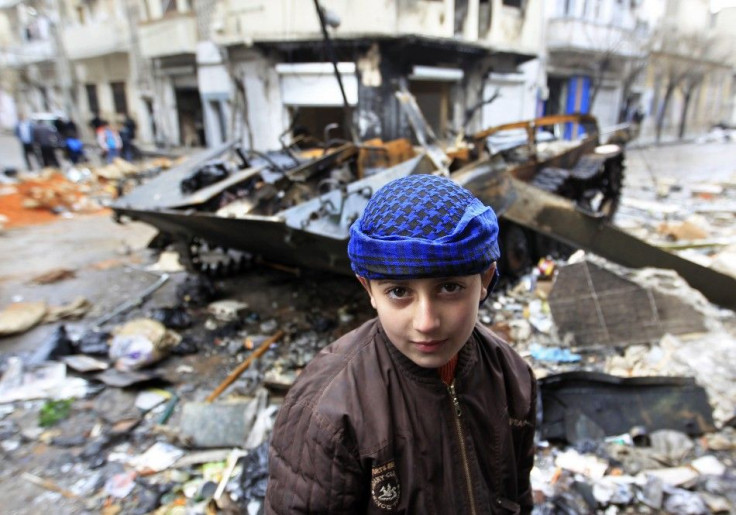Syrian Rebels Driven Out of Homs, Assad Scents 'Final Victory'

(Reuters) - Defeated Syrian rebels abandoned their shattered stronghold in Homs, giving way to a 26-day army assault on a city that had become a symbol of the year-long revolt against President Bashar al-Assad.
Activists said Syria's army had begun hunting down and killing insurgents who stayed to cover their comrades' tactical retreat from the city's battle-scarred Baba Amro district, although the reports could not be verified independently.
One pro-government figure said troops had broken the back of the uprising and the rebel withdrawal heralded impending victory over a Western-backed insurgency.
Soon afterward, the international Red Cross said Syrian authorities had finally given it the green light to take aid into Baba Amro on Friday.
As news of the pull-out spread, video footage released on the internet appeared to show the bodies of American journalist Marie Colvin and French photographer Remi Ochlik being buried in Homs, where they were killed in shelling eight days ago.
French journalists Edith Bouvier, who was wounded in the same bombardment, and William Daniels escaped to Lebanon on Thursday, France's President Nicolas Sarkozy said, of the last of a handful of reporters trapped in the city.
Armed rebels and defecting soldiers have been spearheading the revolt against Assad that began with largely peaceful protests inspired by the Arab Spring, but escalated after a bloody government crackdown.
Reports from Homs, seen as a bastion of rebel resistance, could not be verified immediately due to tight government restrictions on media operations in Syria.
At least 17 rebels were put to death with knives after they were chased into nearby fields, one activist told Reuters.
Scattered gunfire could be heard inside Baba Amro and sporadic shelling hit nearby districts, the activists said. The overall level of combat exchanges seemed to have receded.
Snow blanketed the city, where hundreds have died and residents are short of food, fuel, power, water and telephone links, activists said.
The Free Syrian Army and all the other fighters have left Baba Amro, one activist said from Homs. They pulled out.
SCENTING VICTORY
The drama in Homs unfolded without any immediate comment from Syrian officials or the state media, but Taleb Ibrahim, a Syrian analyst close to the government, said the military's operation in Homs had broken the back of the armed groups.
It's the beginning of Syria's final victory over the Qatari, Saudi, French, American and Zionist conspiracy against Syria, he told Lebanon's Hezbollah-run al-Manar television.
A Lebanese official close to Damascus said Assad's government was determined to regain control of Homs, Syria's third city, which straddles the main north-south highway.
They want to take it, whatever happens, without restraint, whatever the cost, the official said, asking not to be named.
He said defeat for the rebels in Homs would leave the opposition without any major stronghold in Syria, easing the crisis for Assad, who remained confident he could survive.
President Assad, a London-trained eye doctor, is increasingly isolated in his struggle to crush an armed insurrection.
He has received significant backing from Russia which, along with China, has shielded Assad from U.N. Security Council action.
But Russian Prime Minister Vladimir Putin appeared to distance himself from Assad in an interview with the London Times newspaper published on Friday, saying he had no special relationship with the president.
It is up to the Syrians to decide who should run their country ... We need to make sure they stop killing each other, Putin said.
Turkish President Abdullah Gul told Reuters on Thursday that
Russia and Iran would soon realize they had little choice but to join international diplomatic efforts for Assad's removal.
I think in time Russia will see its support has been abused by the Syrian regime. They will recognize this fact when they see the heavy weapons being used against the people in Syria. That is not very tolerable, not even for Russia, he said.
The United Nations says Syrian security forces have killed more than 7,500 civilians since the revolt began last March. Syria's government said in December that armed terrorists had killed more than 2,000 soldiers and police during the unrest.
(Additional reporting by Khaled Yacoub Oweis in Amman, Mariam Karouny, Dominic Evans, Oliver Holmes and Laila Bassam in Beirut, Stephanie Nebehay in Geneva, Steve Gutterman in Moscow and Nour Merza in Dubai; Writing by Alistair Lyon; Editing by Alastair Macdonald)
© Copyright Thomson Reuters 2024. All rights reserved.











